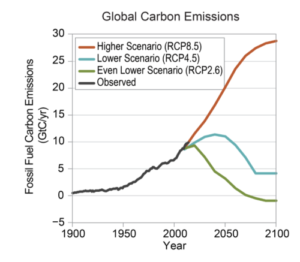by Cross et al., November 29, 2018 in CO2Science
Paper Reviewed
Cross, E.L., Harper, E.M. and Peck, L.S. 2018. A 120-year record of resilience to environmental change in brachiopods. Global Change Biology 24: 2262-2271.
…
In light of all their findings, Cross et al. conclude that “these rhynchonelliform brachiopods have therefore been unaffected in their abilities to construct and maintain their extensive skeletons by the change in ocean acidity and temperature over the last 120 years.” And this is a noteworthy conclusion, given that C. inconspicua is one of the most calcium-carbonate-dependent species globally, and is therefore presumed to be highly susceptible to ocean acidification. It would thus appear that proper incorporation of species’ adaptation and/or acclimation potentials is essential if scientists are to get predictions of the impacts of ocean acidification on marine life correct.
by Julian Wettengel, November 28, 2018 in Euractiv
Germany’s task force on planning the definite phase-out of coal-fired power production has scrapped plans to present a decision before the end of this year.
Several days after three eastern German federal states had demanded better and more detailed plans to support coal mining regions, the so-called coal commission has decided to “conclude its work on 1 February 2019”.
The task force set up a working group from its ranks to draw up further concrete proposals for coal regions and to hold talks on these with both the federal and state governments, the commission said in a press release.
…
by Judith Curry, November 24, 2018 in ClimateEtc.
In considering ‘worst case’ climate change impacts, we first need to assess the realistic worst case for global carbon emissions.
The recently published U.S. National Climate Assessment shows that we are currently on track for RCP8.5.

…
In particular, there is a fairly large number of papers arguing that assumptions about coal are incorrect: (list of papers courtesy of LK).
- The first major study questioning the actual extent of coal reserves: “The Peak in U.S. Coal Production“ by Gregson Vaux, 27 May 2004
- More evidence that reserves are overstated: “Coal Of The Future (Supply Prospects for Thermal Coal by 2030-2050)“ by Energy Edge Limited, Prepared for the Institute for Energy of the European Commission’s Joint Research Centre, February 2007
- More evidence that reserves are overstated: “Coal: Resources and Future Production“ by Energy Watch Group, March 2007 (47 pages,)
- The major study showing that coal reserves are overstated: “Coal: Research and Development to Support National Energy Policy“ by the National Academies, June 2007
- “Why do climate change scenarios return to coal?” by Justin Ritchie and Hadi Dowlatabadi in Energy, 1 December 2017.
La géologie, une science plus que passionnante … et diverse

